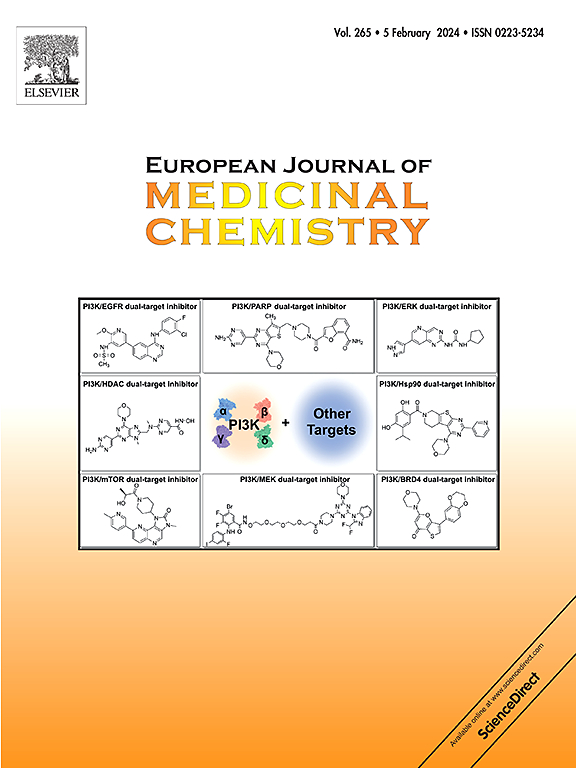利用双石胆酸支架进行选择性唾液基转移酶抑制:一种抑制乳腺癌转移的靶向方法
IF 6
2区 医学
Q1 CHEMISTRY, MEDICINAL
引用次数: 0
摘要
ST6GAL1在三阴性乳腺癌(TNBC)的进展中起着至关重要的作用,突出了其作为这种侵袭性癌症亚型的治疗靶点的潜力。由于TNBC的高转移潜力和现有治疗方法的局限性,迫切需要选择性和有效的ST6GAL1抑制剂。在本研究中,通过从石胆酸到双石胆酸的支架跳跃方法,成功地发现了新的ST6GAL1抑制剂SPP-037和HZF01,具有增强的生物活性和选择性。两种化合物均能显著抑制MDA-MB-231细胞的迁移、HUVEC管的形成、肿瘤的生长和体内外转移。分子对接研究揭示了ST抑制剂与ST6GAL1之间的关键相互作用,支持其增强的选择性和结合亲和力。此外,SPP-037和HZF01被发现阻断整合素α2,6-唾液化,破坏整合素激活和下游信号通路,包括局点粘附激酶(FAK)和paxillin的磷酸化,这对细胞迁移至关重要。这些结果强调了靶向ST6GAL1抑制肿瘤进展和转移的潜力,为治疗侵袭性乳腺癌提供了一条有希望的途径。本文章由计算机程序翻译,如有差异,请以英文原文为准。


Harnessing the bishomolithocholic acid scaffold for selective sialyltransferase inhibition: A targeted approach to suppress breast cancer metastasis
ST6GAL1 plays a crucial role in the progression of triple-negative breast cancer (TNBC), highlighting its potential as a therapeutic target for this aggressive cancer subtype. Due to the high metastatic potential of TNBC and the limitations of current therapies, selective and potent ST6GAL1 inhibitors are urgently needed. In this study, a scaffold-hopping approach from lithocholic acid to bishomolithocholic acid successfully led to the discovery of novel ST6GAL1 inhibitors, SPP-037 and HZF01, with enhanced biological activity and selectivity. Both compounds significantly inhibited MDA-MB-231 cell migration, HUVEC tube formation, tumor growth, and metastasis in vitro and in vivo. Molecular docking studies revealed key interactions between the ST inhibitors and ST6GAL1, supporting their enhanced selectivity and binding affinity. Additionally, SPP-037 and HZF01 were found to block integrin α2,6-sialylation, disrupting integrin activation and downstream signaling pathways involving the phosphorylation of focal adhesion kinase (FAK) and paxillin, which are critical for cell migration. These results underscore the potential of targeting ST6GAL1 to suppress tumor progression and metastasis, offering a promising avenue for treating aggressive breast cancer.
求助全文
通过发布文献求助,成功后即可免费获取论文全文。
去求助
来源期刊
CiteScore
11.70
自引率
9.00%
发文量
863
审稿时长
29 days
期刊介绍:
The European Journal of Medicinal Chemistry is a global journal that publishes studies on all aspects of medicinal chemistry. It provides a medium for publication of original papers and also welcomes critical review papers.
A typical paper would report on the organic synthesis, characterization and pharmacological evaluation of compounds. Other topics of interest are drug design, QSAR, molecular modeling, drug-receptor interactions, molecular aspects of drug metabolism, prodrug synthesis and drug targeting. The journal expects manuscripts to present the rational for a study, provide insight into the design of compounds or understanding of mechanism, or clarify the targets.

 求助内容:
求助内容: 应助结果提醒方式:
应助结果提醒方式:


